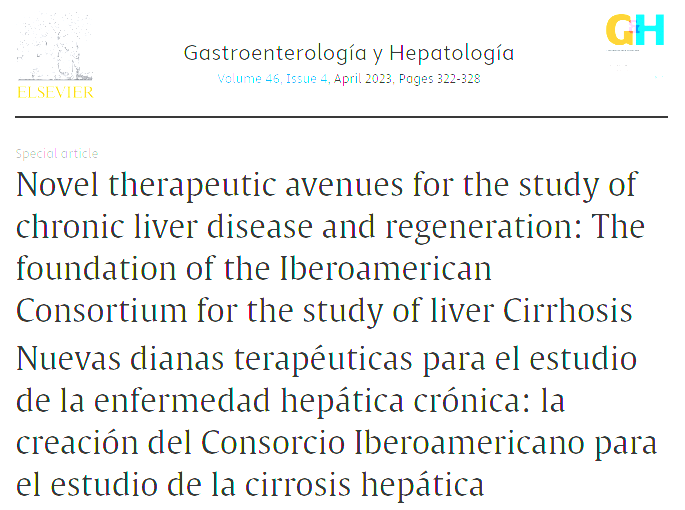Novel therapeutic avenues for the study of chronic liver disease and regeneration: The foundation of the Iberoamerican Consortium for the study of liver Cirrhosis
Unfortunately, there is a gap of understanding in the pathophysiology of chronic liver disease due to the lack of experimental models that exactly mimic the human disease. Additionally, the diagnosis of patients is very poor due to the lack of biomarkers than can detect the disease in early stages. Thus, it is of utmost interest the generation of a multidisciplinary consortium from different countries with a direct translation. The present reports the meeting of the 2021 Iberoamerican Consortium for the study of liver Cirrhosis, held online, in October 2021. The meeting, was focused on the recent advancements in the field of chronic liver disease and cirrhosis with a specific focus on cell pathobiology and liver regeneration, molecular and cellular targets involved in non-alcoholic hepatic steatohepatitis, alcoholic liver disease (ALD), both ALD and western diet, and end-stage liver cirrhosis and hepatocellular carcinoma. In addition, the meeting highlighted recent advances in targeted novel technology (-omics) and opening therapeutic avenues in this field of research
Authors
Sanz-Garcia C, Nevzorova YA, MartÃnez-Naves E, Cubero FJ et al.
External link
Publication Year
Publication Journal
Associeted Project
Microbiology or Immunology
Lista de serviços
-
RASL11A, member of a novel small monomeric GTPase gene family, is down-regulated in prostate tumors.RASL11A, member of a novel small monomeric GTPase gene family, is down-regulated in prostate tumors.
-
Splice variants of TLE family genes and up-regulation of a TLE3 isoform in prostate tumors.Splice variants of TLE family genes and up-regulation of a TLE3 isoform in prostate tumors.
-
Concepts on Microarray Design for Genome and Transcriptome AnalysesConcepts on Microarray Design for Genome and Transcriptome Analyses
-
The iron stimulon of Xylella fastidiosa includes genes for type IV pilus and colicin V-like bacteriocins.The iron stimulon of Xylella fastidiosa includes genes for type IV pilus and colicin V-like bacteriocins.
-
Origins of the Xylella fastidiosa prophage-like regions and their impact in genome differentiation.Origins of the Xylella fastidiosa prophage-like regions and their impact in genome differentiation.
-
The role of prophage in plant-pathogenic bacteria.The role of prophage in plant-pathogenic bacteria.
-
Genetic control of immune response and susceptibility to infectious diseases.Genetic control of immune response and susceptibility to infectious diseases.
-
Building capacity for advances in tuberculosis research; proceedings of the third RePORT international meeting.Building capacity for advances in tuberculosis research; proceedings of the third RePORT international meeting.
-
São Paulo School of Advanced Sciences on Vaccines: an overview.São Paulo School of Advanced Sciences on Vaccines: an overview.
-
A reasonable request for true data sharing.A reasonable request for true data sharing.

